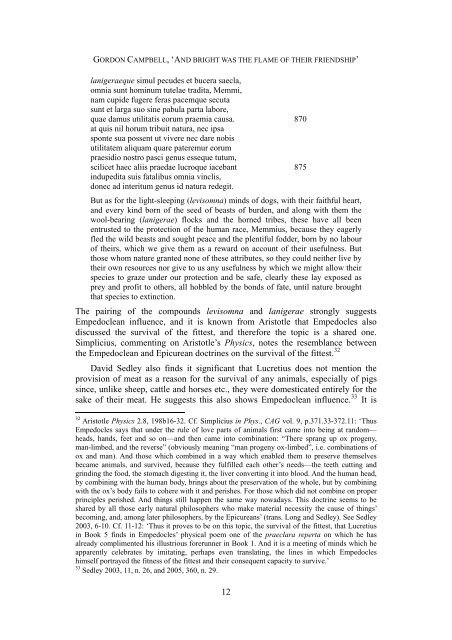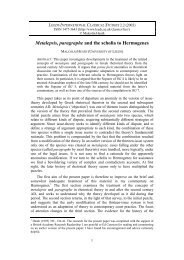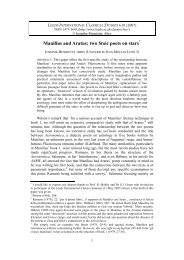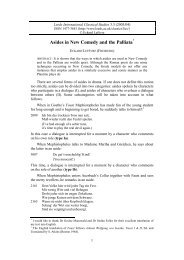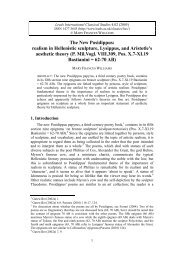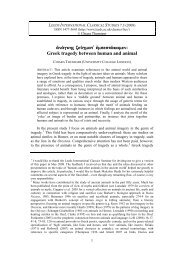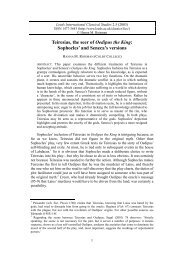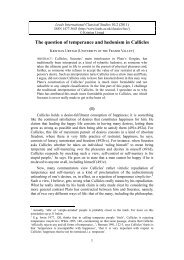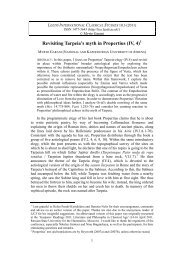'And bright was the flame of their friendship' - Leeds International ...
'And bright was the flame of their friendship' - Leeds International ...
'And bright was the flame of their friendship' - Leeds International ...
Create successful ePaper yourself
Turn your PDF publications into a flip-book with our unique Google optimized e-Paper software.
GORDON CAMPBELL, ‘AND BRIGHT WAS THE FLAME OF THEIR FRIENDSHIP’<br />
lanigeraeque simul pecudes et bucera saecla,<br />
omnia sunt hominum tutelae tradita, Memmi,<br />
nam cupide fugere feras pacemque secuta<br />
sunt et larga suo sine pabula parta labore,<br />
quae damus utilitatis eorum praemia causa. 870<br />
at quis nil horum tribuit natura, nec ipsa<br />
sponte sua possent ut vivere nec dare nobis<br />
utilitatem aliquam quare pateremur eorum<br />
praesidio nostro pasci genus esseque tutum,<br />
scilicet haec aliis praedae lucroque iacebant 875<br />
indupedita suis fatalibus omnia vinclis,<br />
donec ad interitum genus id natura redegit.<br />
But as for <strong>the</strong> light-sleeping (levisomna) minds <strong>of</strong> dogs, with <strong>the</strong>ir faithful heart,<br />
and every kind born <strong>of</strong> <strong>the</strong> seed <strong>of</strong> beasts <strong>of</strong> burden, and along with <strong>the</strong>m <strong>the</strong><br />
wool-bearing (lanigerae) flocks and <strong>the</strong> horned tribes, <strong>the</strong>se have all been<br />
entrusted to <strong>the</strong> protection <strong>of</strong> <strong>the</strong> human race, Memmius, because <strong>the</strong>y eagerly<br />
fled <strong>the</strong> wild beasts and sought peace and <strong>the</strong> plentiful fodder, born by no labour<br />
<strong>of</strong> <strong>the</strong>irs, which we give <strong>the</strong>m as a reward on account <strong>of</strong> <strong>the</strong>ir usefulness. But<br />
those whom nature granted none <strong>of</strong> <strong>the</strong>se attributes, so <strong>the</strong>y could nei<strong>the</strong>r live by<br />
<strong>the</strong>ir own resources nor give to us any usefulness by which we might allow <strong>the</strong>ir<br />
species to graze under our protection and be safe, clearly <strong>the</strong>se lay exposed as<br />
prey and pr<strong>of</strong>it to o<strong>the</strong>rs, all hobbled by <strong>the</strong> bonds <strong>of</strong> fate, until nature brought<br />
that species to extinction.<br />
The pairing <strong>of</strong> <strong>the</strong> compounds levisomna and lanigerae strongly suggests<br />
Empedoclean influence, and it is known from Aristotle that Empedocles also<br />
discussed <strong>the</strong> survival <strong>of</strong> <strong>the</strong> fittest, and <strong>the</strong>refore <strong>the</strong> topic is a shared one.<br />
Simplicius, commenting on Aristotle’s Physics, notes <strong>the</strong> resemblance between<br />
<strong>the</strong> Empedoclean and Epicurean doctrines on <strong>the</strong> survival <strong>of</strong> <strong>the</strong> fittest. 32<br />
David Sedley also finds it significant that Lucretius does not mention <strong>the</strong><br />
provision <strong>of</strong> meat as a reason for <strong>the</strong> survival <strong>of</strong> any animals, especially <strong>of</strong> pigs<br />
since, unlike sheep, cattle and horses etc., <strong>the</strong>y were domesticated entirely for <strong>the</strong><br />
sake <strong>of</strong> <strong>the</strong>ir meat. He suggests this also shows Empedoclean influence. 33 It is<br />
32 Aristotle Physics 2.8, 198b16-32. Cf. Simplicius in Phys., CAG vol. 9, p.371.33-372.11: ‘Thus<br />
Empedocles says that under <strong>the</strong> rule <strong>of</strong> love parts <strong>of</strong> animals first came into being at random—<br />
heads, hands, feet and so on—and <strong>the</strong>n came into combination: “There sprang up ox progeny,<br />
man-limbed, and <strong>the</strong> reverse” (obviously meaning “man progeny ox-limbed”, i.e. combinations <strong>of</strong><br />
ox and man). And those which combined in a way which enabled <strong>the</strong>m to preserve <strong>the</strong>mselves<br />
became animals, and survived, because <strong>the</strong>y fulfilled each o<strong>the</strong>r’s needs—<strong>the</strong> teeth cutting and<br />
grinding <strong>the</strong> food, <strong>the</strong> stomach digesting it, <strong>the</strong> liver converting it into blood. And <strong>the</strong> human head,<br />
by combining with <strong>the</strong> human body, brings about <strong>the</strong> preservation <strong>of</strong> <strong>the</strong> whole, but by combining<br />
with <strong>the</strong> ox’s body fails to cohere with it and perishes. For those which did not combine on proper<br />
principles perished. And things still happen <strong>the</strong> same way nowadays. This doctrine seems to be<br />
shared by all those early natural philosophers who make material necessity <strong>the</strong> cause <strong>of</strong> things’<br />
becoming, and, among later philosophers, by <strong>the</strong> Epicureans’ (trans. Long and Sedley). See Sedley<br />
2003, 6-10. Cf. 11-12: ‘Thus it proves to be on this topic, <strong>the</strong> survival <strong>of</strong> <strong>the</strong> fittest, that Lucretius<br />
in Book 5 finds in Empedocles’ physical poem one <strong>of</strong> <strong>the</strong> praeclara reperta on which he has<br />
already complimented his illustrious forerunner in Book 1. And it is a meeting <strong>of</strong> minds which he<br />
apparently celebrates by imitating, perhaps even translating, <strong>the</strong> lines in which Empedocles<br />
himself portrayed <strong>the</strong> fitness <strong>of</strong> <strong>the</strong> fittest and <strong>the</strong>ir consequent capacity to survive.’<br />
33 Sedley 2003, 11, n. 26, and 2005, 360, n. 29.<br />
12


